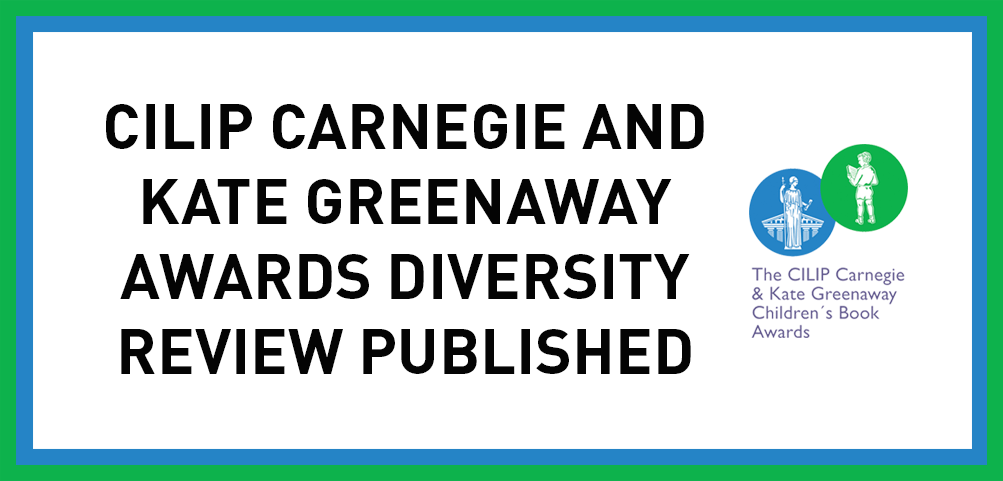CILIP CARNEGIE AND KATE GREENAWAY AWARDS DIVERSITY REVIEW PUBLISHED

The final report of the CILIP Carnegie and Kate Greenaway Awards Independent Diversity Review has been published following concerns about the lack of British and Minority Ethnic (BAME) representation on the 2017 Carnegie and Kate Greenaway Medal longlists, the UK’s oldest prizes for children’s books.
The Review was chaired by Dr Margaret Casely-Hayford CBE, Chair of Shakespeare’s Globe and Chancellor of Coventry University, who praised the “solidarity and collaborative spirit from members of the book industry” who contributed to the Review. In her introduction to the report, she raised the importance of representation for both visible and invisible diversities, and highlighted the need for “creating a larger source of role models to inspire young readers to become future writers”. In order to get the most representative, diverse feedback, the Chartered Institute of Library and Information Professionals (CILIP) consulted young readers, publishers, authors, illustrators and librarians to examine the representation of age, gender, ethnicity, disability, sexuality, social class and education.
Ten recommendations have been made to CILIP by Dr Casely-Hayford to help ensure the Awards are as inclusive as possible in future:
- Explicitly champion diversity through the Awards’ strategies, development plans and messages including a statement of a robust and proactive strategy for the Awards that clearly states a commitment to diversity and inclusion with clear vision, objectives, and positive action towards stated intended outcomes.
- Recognise a diverse range of voices and perspectives in the nominations, longlist, shortlist and prize winners.
- Expand the diversity profile of the judges by increasing the variety of backgrounds and lived experiences among CILIP’s panel of librarian judges.
- Establish an equality, diversity and inclusion advisory panel to accelerate the embedding of diversity and inclusion throughout the Awards.
- Strengthen the diversity training that librarian judges receive to instil heightened awareness of diversity and inclusion and understanding of the impact of power dynamics, as well as acknowledgement of inevitable personal biases in all members of the panel.
- Review the Awards criteria through an open and collaborative process that includes a diversity of perspectives and lived-experience. Consider the inclusion of criteria for innovation, shifting perceptions, or writing about different backgrounds and experience as indicators of quality and excellence.
- Empower and celebrate the children and young people involved in the Awards through the shadowing scheme by giving them a significant voice and visible presence in the process and prize-giving.
- Strengthen the governance that supports the Awards’ strategic direction, calling on internal and external experts to lead the Awards through a sustainable change process over the short and long term.
- Raise greater awareness of diverse books among librarians and identify opportunities for further championing of diversity with the library supply sector.
- Increase outreach by opening up and amplifying the nominations process, discovering and recognising new and diverse talent and forging new partnerships.
Nick Poole, Chief Executive of CILIP, said: “We wholeheartedly welcome this report and thank Margaret Casely-Hayford for her skilful chairing and leadership. Children’s literature and illustration have a unique power to shine a light on the world as it is and to help us to imagine a better one – and because of this we have an immense responsibility in how we develop and promote these Awards as ethical librarians”.
“This review provides an opportunity to recognise and reinforce the message that width of diversity and quality are synonymous. CILIP and the CILIP Youth Libraries Group are committed to ensuring that the Awards are a positive force to promote readership and diversity across the industry. I am pleased that we have been able to take action that will impact immediately, as well as looking ahead to long-term change.”
The full report can be read here and follows a recent survey from the Centre for Literacy in Primary Education (CLPE) that found only 4% of the children’s books published in 2017 featured a BAME character. We’d like to thank all ALCS members who took part in this survey after we shared it in the March edition of ALCS News.
About CILIP
CILIP is the leading voice for the information, knowledge management and library profession. Their goal is to put information and library skills and professional values at the heart of a democratic, equal and prosperous society. ALCS and CILIP have been in partnership for over a decade. The hugely successful Carnegie and Kate Greenaway (CKG) Shadowing Scheme reaches an estimated 100,000 children each year across the country. Participating children read the books shortlisted for the CKG Awards, discuss with each other which they think is the best, post reviews and vote for their favourite books before the official winners are announced. The CKG Shadowing Scheme is one of the UK’s major ‘reading for pleasure’ initiatives and is almost exclusively run as an extracurricular activity by English teachers and school librarians.
